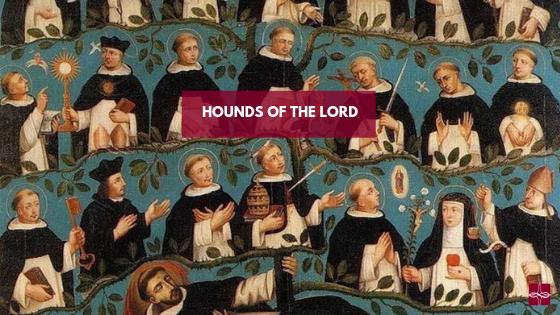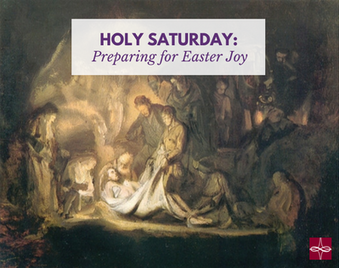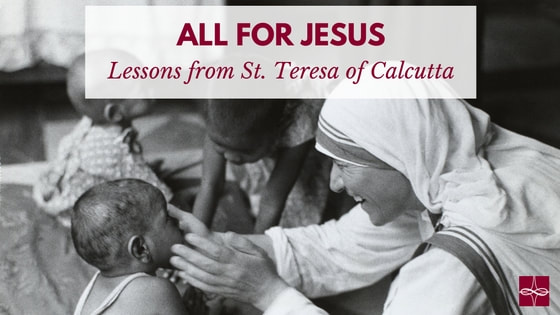|
Throughout my studies at The Catholic University of America, I had the opportunity to witness and participate in the sacred traditions and rites of various religious orders I would never have encountered back at home. A great blessing of my place of study was the constant flux of various clergy, seminarians, and religious throughout campus who were undertaking a degree program or simply passing through campus in their respective ministries. God bless the Franciscans, Little Sisters of the Poor, Marians, Sisters of Life, Sisters Servants of Mary Immaculate, Pallottines, and the Missionaries of Charity, to name a few, who joyfully lived out their vocations—inspiring observers to get to know them and their spiritualties and facilitating an encounter with the Lord.
In God’s providence, I frequently found myself at the Dominican House of Studies at the far side of campus and was able to join the community of brothers and priests in their night prayers and certain liturgical celebrations which were open to the public. Personally, I found the house to be a commanding presence and a bit daunting on the inside: the intellectual prowess of the Order of Preachers and its faithful carrying out of its mandate to preach conveyed a certain spiritual seriousness which drew me in all the more. How striking were the resonating, unified, and almost haunting tones of the sacred chants of prayer, together with the corresponding gestures and postures and the dimmed lights! And yet, in wonderful moments of levity, the very same Dominicans could be found performing excellent bluegrass music as “The Hillbilly Thomists”! Before Dominic’s mother conceived him, she dreamt a dog leapt from her womb and set the world on fire. Dominic went on to become a priest and ultimately founded the Order of Preachers—the Dominicans. The Dominicans rose to the forefront of the intellectual life of the Middle Ages as they announced the Gospel, combatted heresy, gave quality spiritual and scholastic instructions, and contributed unmatched gifts to schools of theology and philosophy. They are lovingly nicknamed “the hounds of the Lord.” The Order has raised up many saints and conferees who ministered to every corner of the world, advocating for the rights of Native Americans, standardizing the liturgy of the Mass, compiling the Church’s canonical laws, composing timeless sacred hymns, caring for the poor, advancing the correlation of faith and science, and promoting the holy Rosary. Western civilization owes a debt of gratitude for the contributions of Dominicans such as Saints Thomas Aquinas, Albert the Great, Pope Pius V, Catherine of Siena, Rose of Lima, Louis de Montfort, and Martin de Porres. Participating from time to time in the life of that religious community gave me a lovely insight into the incredible mysticism of the Order and of the Church Universal. Such a powerful instrument of personal and theological devotion is not the closely held property of one religious order or vocation, but a gift available to anyone who seeks to enhance their personal spirituality with deeply historic and touching methods. This involves realizing the soul as something more sacred than just consciousness; the soul is able to love which helps to better relate to God, who is Love incarnate, emotionally and ecstatically rather than merely intellectually. And you don’t need the philosophical and theological background of a Dominican to similarly enhance your own prayer life! You can begin by quietly placing yourself in the holy presence of God and focusing on the love He offers and the ways He is being loved (or not) in return. Going deeper, it could be beneficial to read the thoughts and reflections of various Dominican saints who embraced a similar spirituality. How good God is to have called upon Saint Dominic hundreds of years ago to begin such an incredible religious order committed to promoting Truth and the mandate to praise, to bless, and to preach (In fact, that is one motto of the Order!).The work of the Dominicans is especially needed today in our society of moral relativism and secularism. Let us pray that many more answer God’s ongoing call for holy religious and priestly vocations. And may we, as lay people, continuously support the Church which offers so many varied spiritual treasures for our sanctification.
0 Comments
It’s Holy Saturday. Jesus is dead; a boulder is in front of the tomb, and it is sealed. He is gone. So now what? What next? On Holy Saturday, my thoughts are with the apostles. Although Jesus foretold of his death, I’m not sure that they actually believed him or that they imagined it would consist of the sacrifice on the Cross. But Holy Saturday is when the reality hits them. Just imagine the millions of questions that they must have had. I imagine that they were similar to the ones above. “Now what? What next?” Imagining the disciples left with these unsolved questions, I start to realize that I too have had some questions when the going got tough or when I faced challenges, like on a recent mission trip. A few weeks ago, I had the privilege of accompanying 18 students from The Catholic University of America and two other staff members to the island nation of Jamaica for an alternative spring break cultural immersion trip. While in Jamaica, we visited several sites run by organizations like the Missionaries of Charity, the Missionaries of the Poor, and the St. Patrick’s Foundation. The most impactful day for me was the one I spent at Bethlehem House. Bethlehem House is a home for children with severe mental and physical disabilities. Of the eighty children who live there, only about twenty receive the occasional visit from their families. The rest of the children likely never see their families again. Most of them will also never be able to live on their own without significant medical assistance. The missionary in charge of the home asked if I would work with the older children, telling me that these children get the fewest visitors either by family members or by outside groups. “They need your love more than anyone else here,” he told me as he dropped me off in the room. It was just me, a caretaker (who only spoke Patois, a native language of Jamaica that is a mix of Scots and Creole) and the children. For the first hour, I didn’t know what to do. I was dumbfounded, heartbroken, and depressed by their situation. I could barely even crack a smile, let alone laugh. I didn’t understand the joy that others had talked about working with this group of children. I was aimlessly walking around the room, wondering, “What next?”. As one hour turned into two, one of the children woke up from a nap. He shouted from across the room “Hey! Hey you!” I looked at him and he said, “Come here and pick me up!” Still dumbfounded, I walked over to his crib and picked him up. He quickly told me that his name was Ashanti. Ashanti was one of the few children who was able to have a full conversation. He had such severe scoliosis that he was paralyzed from the waist down and had a lump in his back. Ashanti also had an enlarged, misshapen head. After about five minutes of walking around and talking with me, he grabbed my beard and declared that I was his best friend. He smiled and let out the most infectious laugh I have ever heard! In that moment, I knew that I was not looking just at Ashanti’s face, but at the very face of Jesus laughing and expressing joy. I learned more about love in those five minutes then I had learned in years. The rest of my day at Bethlehem House was full of joy, even in the midst of such extraordinarily difficult circumstances. In reflecting about that day, I think about the apostles on Holy Saturday who had locked themselves away in the Upper Room, unsure of what was next. They wondered and waited. But Easter did come, and their joy returned. The face of Jesus did appear again, just as it had for me in my experience with Ashanti. After Easter and with that joy, the apostles went out into the world proclaiming the Gospel. We too are called to encounter Christ in the joy of Easter and spread the Gospel message. More often than not, our days are like Holy Saturday. We experience days when all seems lost and hope seems foolish. But we must resist that temptation, resist the idea that hope will not return, that joy is lost forever. We know that Easter is coming and will always come. Joy will have its triumph. And it can be shared and experienced by all those we encounter. So on this Holy Saturday, let us be like the apostles and go out into this world after experiencing the joy that awaits us on Easter Sunday! For more Lenten and Easter resources, please click here. Today we celebrate the fifth anniversary of Pope Francis’ pontificate. In these short years, Pope Francis has done much to continue the work of his predecessors in building a culture of evangelization and inviting each member of the Church to live out their baptismal call as missionary disciples. Several important Church documents have been released throughout his papacy, including Evangelii Gaudium, the Apostolic Exhortation on the Proclamation of the Gospel in Today’s World, Laudato Si’, the encyclical on Care for our Common Home, and Amoris Laetitia, a post-synodal Apostolic Exhortation on Love in the Family. Pope Francis has participated in two World Youth Days, made roughly 22 international apostolic visits, and has canonized 885 saints. He called for the Jubilee Year of Mercy from 2015-2016. I would like to celebrate the fifth anniversary of his election by sharing some quotes that characterize his papacy and capture its tone.
1. A Church on Mission "I prefer a Church which is bruised, hurting and dirty because it has been out on the streets, rather than a Church which is unhealthy from being confined and from clinging to its own security… More than by fear of going astray, my hope is that we will be moved by the fear of remaining shut up within structures which give us a false sense of security, within rules which make us harsh judges, within habits which make us feel safe, while at our door people are starving. -Evangelii Gaudium, 49 Pope Francis envisions a missionary church—one with open doors to welcome people in, but also for each of us to step out and bring the Good News of Jesus Christ to the world. As Christians, it can be tempting to remain within the safety of our parish and Church community. However, Jesus calls us to “go out to the nations” and encounter the hurting world. Pope Francis reminds us of this evangelizing spirit entrusted to us by Jesus Christ and challenges us to be a Church on mission. 2. The Inherent Dignity of Mankind and Creation “Our insistence that each human being is an image of God should not make us overlook the fact that each creature has its own purpose. None is superfluous. The entire material universe speaks of God’s love, his boundless affection for us. Soil, water, mountains: everything is, as it were, a caress of God.” -Laudato Si, 84 About two years into his papacy, Pope Francis released his encyclical Laudato Si’, focusing on our responsibility as stewards of creation. No other pope has dedicated an entire encyclical to the care of creation. In doing so, Pope Francis reminds us that all of the created world helps us to glimpse and better know God Himself. Mankind is the pinnacle of creation, made in God’s image and likeness. In Laudato Si’, Pope Francis reminds us of each person’s inherent dignity, made with his or her own purpose, gifts, and mission. 3. The Transformative Power of Christ’s Love “Jesus’ love goes before us, his look anticipates our needs. He can see beyond appearances, beyond sin, beyond failures and unworthiness…He sees beyond this, to our dignity as sons and daughters, a dignity at times sullied by sin, but one which endures in the depth of our soul. He came precisely to seek out all those who feel unworthy of God, unworthy of others.” – Homily at Plaza de la Revolución during his Apostolic Journey to Cuba At the heart of the Christian life is an encounter with Jesus Christ. His love is transformative, life-changing. We encounter Christ in prayer, the sacraments, the parish, in one another. However, we cannot overestimate the importance of our prayer life—of moments throughout each day in which we enter into dialogue with God, offer up our work and sacrifices, remember the needs of others, or give God praise. When we carve out time each day for prayer, we are better able to know the look of Christ that goes beyond the worldly way of seeing things into our dignity as sons and daughters of God. 4. The Role of the Church in the Christian Life "We cannot understand Christ without his Church, just as we cannot understand the Church without her spouse, Christ Jesus, who gave his life out of love, and who makes us see that it is worth the price.” -Prayer Vigil for the Festival of Families in Philadelphia I love this quote because it sums up the relationship between Christ and His Church. We cannot know Christ apart from the Church, just as the Church cannot exist without Christ. Christ founded the Church in order to be a place of encounter with Him through the sacraments and through one another. We come to more fully know the love of God in the life of each parish. How can we create communities of encounter in our various parishes? Is the light of Christ truly shining forth in our communities? 5. The Messiness and Joy of Family Life “I thank God that many families, which are far from considering themselves perfect, live in love, fulfill their calling and keep moving forward, even if they fall many times along the way. The Synod’s reflections show us that there is no stereotype of the ideal family, but rather a challenging mosaic made up of many different realities, with all their joys, hopes and problems.” -Amoris Laetitia, 57 Pope Francis speaks realistically of human life and love. The family, the domestic church, is not perfect. We are called to learn and grow in love throughout our entire lives, just as we are called to learn and grow in holiness. The family is the place where love is mastered and refined. It is the foundation of society and of the Church. Pope Francis calls families to journey joyfully on the path of love. He invites us not to fear our imperfection, but to keep moving forward in hope and joy. 6. Not Letting Fear Impact Vocational Discernment “The work of discernment identifies our fears and can then help us to overcome them, opening us to life and helping us to calmly face the challenges that come our way. For us Christians in particular, fear must never have the last word but rather should be an occasion to make an act of faith in God… and in life!” -Message for World Youth Day Panama In preparation for the 2018 Synod on Young People, the Faith and Vocational Discernment and World Youth Day 2019 in Panama, Pope Francis spoke of the process of discernment, especially for young people today. Fear is often at the heart of our actions—or inaction. Christians, however, have no cause for fear. As we discern God’s call for our life each day, let us place our trust in Him and act with courage and boldness. God has created us for a unique mission that only we can fulfill in His Church. Let us discern his will for us, as Pope Francis encourages, “trusting that he will lead us to a good end.” 7. The Importance of Contemplating and Encountering God’s Mercy “We need constantly to contemplate the mystery of mercy. It is a wellspring of joy, serenity, and peace. Our salvation depends on it.” -Misericordiae Vultus, Bull of Indiction for the Extraordinary Jubilee of Mercy Starting in 2015, Pope Francis instituted the first Jubilee Year of Mercy in the Catholic Church. Throughout this time, he invited the Church to contemplate once more the merciful gaze of the Father and experience God’s mercy in our lives. We cannot be merciful without first having personally experienced the mercy of God. I loved that as a Church, we dedicated a year to contemplating this great mystery. We know God as Father, Savior, Creator, Just Judge, and many other titles. But how often to experience His mercy, as evidenced in the parable of the Prodigal Son and in the story of Jesus meeting the Woman at the Well? 8. Our True Identity “That is our real ‘stature,’ our spiritual identity: we are God’s beloved children, always. So you can see that not to accept ourselves, to live glumly, to be negative, means not to recognize our deepest identity…God loves us the way we are, and no sin, fault or mistake of ours makes him change his mind…God counts on you for what you are, not for what you possess…In his eyes, you are precious, and your value is inestimable.” -Homily at World Youth Day Mass in Krakow At World Youth Day in Krakow back in 2016, Pope Francis reminded youth and young adults of an incredible universal truth : that our identity lies in being God’s children. In a world so often focused on our careers, material possessions, prestige, or online presence, Pope Francis gets to the heart of our identity as being completely loved by God. It’s easy to forget that we are loved simply because we exist. We all hold a valuable and irreplaceable space in God’s heart. By being most authentically ourselves, we are better able to fulfill our mission within His kingdom and become the saints He wants us to be. 9. Using Technology and Social Media Wisely “Communication has the power to build bridges, to enable encounter and inclusion, and thus to enrich society…Words can build bridges between individuals and within families, social groups and peoples. This is possible both in the material world and the digital world.” -World Day of Communication 2016 We live in a world saturated by social media, technology, and widespread communication. Used irresponsibly, these can isolate and distract mankind. Pope Francis encourages people today to use technology and social media in order to promote a culture of encounter and accompaniment. He challenges us to be “digital citizens” who are not afraid to use technology to spread the Gospel. 10. Being People “For Others” “Love has no alibi. Whenever we set out to love as Jesus loved, we have to take the Lord as our example; especially when it comes to loving the poor.” -Message for the First World Day of the Poor In 2017, Pope Francis called for the first World Day of the Poor—a day in which we act not only in word, but in deed in order to alleviate poverty and accompany those on the margins of society. Pope Francis encourages the world to give and not to count the cost, to love as God first loved us. In a culture of consumerism, we can easily forget to think about our neighbor or those less fortunate than ourselves. Pope Francis reminds us of the importance of giving freely, drawing near to the poor, embracing them, and being transformed through that process. Click here for free resources on Catholic Social Teaching. Question for Reflection: Do you have a favorite quote from Pope Francis’ papacy that’s not listed above? Share it in the comment section below and let us know why it’s powerful for you. Two weeks ago, I was walking from my cozy warm apartment in the Northeast part of Washington, D.C. to Union Station to meet up with a friend for dinner. It was 18*F (-7*C) outside and the wind was just starting to pick up. There were forecasts of snow in the next few days. I was bundled up with a wool sweater, socks, jacket, scarf, and gloves. About ten minutes into my walk, I started to regret my decision to walk and wondered if I should’ve called a cab. As I approached Union Station, I could see the Capitol building lit up in the distance. It was there that I saw 8 people lying on the streets completely covered with layers and layers of clothing and blankets. I immediately forgot my own brief and temporary plight. It was a stark and chilling reminder of the great poverty that still exists not only in other countries, but right here in the United States in our capital city. Each January, the Church in the United States recognizes Poverty Awareness Month and takes up Pope Francis' challenge “to live in solidarity with the poor.” Last year, Pope Francis called for the observance of the very first World Day of the Poor. This call was not just for faithful Catholics, but for people of all nationalities, creeds, and socioeconomic backgrounds. As he said in his message for the first World Day of the Poor, “Love has no alibi. Whenever we set out to love as Jesus loved, we have to take the Lord as our example; especially when it comes to loving the poor.” The church and world responded with countless acts of charity and kindness to the poor. Poverty is a massive issue with far too many heartbreaking statistics for us to consider it on only one day each year. It is a concern that needs constant attention and awareness that we can cultivate on a daily basis. Poverty does not simply come in the form of homelessness, but can manifest itself in many different ways. It can be manifested in our neighbor who has to choose between buying prescriptions or groceries, or in the child who cannot focus on school because they have not eaten the proper food they need. It can be manifested in the single mother who cannot afford childcare while she works. Each of us can work towards helping to alleviate poverty. Here at The Catholic University of America, we run a large number of different programs throughout the year that highlight various forms of poverty and ways to help. Twice a year we have massive service days during which we send nearly 900 students to help local organizations that serve the poor. Every week we have twenty opportunities for students to serve the poor across seven different service sites. Some of these include going to soup kitchens or after-school centers and volunteering with the Missionaries of Charity. One of the most highly attended opportunities is a recurring homeless food run in which students take food and supplies to areas of D.C. with large homeless populations. The students do not simply pass out food, but sit and talk with the homeless. They get to know poverty on the most human level possible. They offer their resources, time, and love to those in need. These types of efforts enable us not only to give the poor material goods and the gift of our time, but also help us personally grow. Walking in solidarity with our brothers and sisters and encountering them leaves us transformed. As Pope Francis wrote in Evangelii Gaudium, “This is why I want a Church which is poor and for the poor. They have much to teach us. Not only do they share in the sensus fidei, but in their difficulties they know the suffering Christ. We need to let ourselves be evangelized by them…” Throughout the year, I encourage you to consider participating in or making your own outreach to help those in need—and to bring a friend. Let us allow ourselves to be evangelized by the poor, live in solidarity with them, and work to alleviate their suffering. As St. Vincent Pallotti, the patron of the Catholic Apostolate Center, reminds us, “Remember that the Christian life is one of action; not of speech and daydreams. Let there be few words and many deeds, and let them be done well.” Questions for Reflection: What are some concrete ways you can help alleviate poverty? Has a personal encounter with the poverty of another ever impacted your spiritual life? I have always admired Mother Teresa and her incredible mission, along with her reflective heart. I am so happy that I can now call upon her as St. Teresa of Calcutta, as she was just canonized on September 4, 2016! As I have studied and learned more about her, it seems as if St. Teresa of Calcutta would have dreaded knowing of her public canonization! She never wanted her writings or her work to bring attention to herself, but rather, she only desired to bring hearts to Jesus Christ. In her honor, I want to reflect on how her understanding of the world can bring our focus less on her and bring our hearts to Jesus. St. Teresa of Calcutta taught us that God is in every living thing. She wrote, “Seeking the face of God in everything, everyone, all the time, and his hand in every happening; This is what it means to be contemplative in the heart of the world. Seeing and adoring the presence of Jesus, especially in the lowly appearance of bread, and in the distressing disguise of the poor” (St. Teresa of Calcutta, In the Heart of the World: Thoughts, Stories and Prayers). Furthermore, St. Teresa of Calcutta taught us to seek Christ in every person we encounter. She recognized that each human being is created uniquely and beautifully. Each person is the face of God calling us to serve God by serving them. As Jesus said, “I was hungry and you gave me food, I was thirsty and you gave me drink, a stranger and you welcomed me, naked and you clothed me, ill and you cared for me, in prison and you visited me’” (Matthew 25:34-36). When we love through the corporal and spiritual works of mercy as St. Teresa of Calcutta did, we are better able to see God more clearly in others. Imitating Christ by practicing the works of mercy also invites us to and see him more clearly in the Eucharist. Receiving Jesus in the Eucharist was essential for St. Teresa of Calcutta, as she knew Jesus was the fuel to teach her how to love others better and bring more souls into God’s embrace. She recognized that Christ’s love lives on in his humility of becoming our Eucharistic food and in the hearts of the poor, which includes the physically, mentally, and spiritually poor. Bringing souls to Christ was a deep mission of St. Teresa of Calcutta. She consistently reflected over two of Jesus’ last words of his Passion – “I thirst” – and had them written next to the crucifixes in the chapels of the Missionaries of Charity (the religious order St. Teresa of Calcutta established in 1950) to remind her sisters that their mission was to satiate Christ’s thirsts for souls. When going to Jesus at the Cross, St. Teresa of Calcutta wanted us to feel his thirst and love for us. She believed that Christ wants us to rest in his love. St. Teresa of Calcutta left behind a deep legacy of letting the world know just how loved and treasured we are. Her message teaches us that God loves us deeply and thirsts for us. When we know we are deeply loved by God, we can endure any suffering because we know joy is possible in the midst of carrying our own crosses. St. Teresa of Calcutta felt the pain of Jesus’ Passion deeply in her work in the slums of Calcutta and in the contemplations of her heart. She witnessed suffering first-hand taking care of the poorest of the poor and also experienced feelings of desolation and dryness in the spiritual life. Throughout it all, her joy remained full and she devoutly loved the Lord. St. Teresa of Calcutta is a beautiful witness of the mystery of suffering with Christ joyfully. As we contemplate the great love, faith, and work of St. Teresa of Calcutta , we can pray with one of her favorite prayers: The Memorare. With such deep trust for God, she was consistently confident in the Lord’s ability to work miracles. Often, she prayed an “emergency novena,” praying nine Memorares in a row and a tenth in thanksgiving to God for a holy request. With confidence in our Lord, and thanksgiving for the testimony of St. Teresa of Calcutta, let us run to Jesus through Mary, that we may become steadfast in holiness, find joy in suffering, quench the thirst of Christ, and be confident in the good work that God is doing within us! Remember, O most gracious Virgin Mary, that never was it known that anyone who fled to thy protection, implored thy help, or sought thine intercession was left unaided. Inspired by this confidence, I fly unto thee, O Virgin of virgins, my mother; to thee do I come, before thee I stand, sinful and sorrowful. O Mother of the Word Incarnate, despise not my petitions, but in thy mercy hear and answer me. St. Teresa of Calcutta, pray for us! Alyce Shields is a teacher in Washington D.C.
|
Details
Archives
July 2024
Categories
All
|
About |
Media |
© COPYRIGHT 2024 | ALL RIGHTS RESERVED









 RSS Feed
RSS Feed